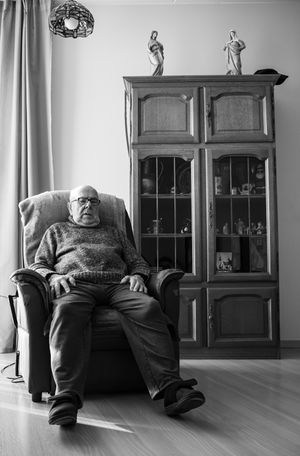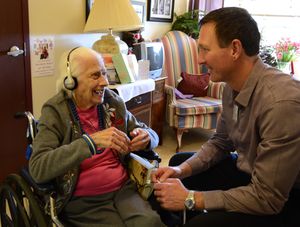Palliative Care In Dementia
Top Contributors - Khloud Shreif, Lucy Aird, Kim Jackson and Vidya Acharya
Introduction[edit | edit source]
Dementia encompasses a group of symptoms that initially present as cognitive difficulties such as memory loss, decision-making challenges, and changes in personality. Over time the symptoms of dementia can worsen, ultimately affecting psychological and physical functions. The journey through dementia varies, with many reaching advanced stages requiring institutional care, facing a myriad of symptoms and complications. Palliative care plays an important role not just for those nearing the end of life but for anyone managing serious, chronic illnesses at any stage, focusing on enhancing quality of life, pain management, and providing psychological support. Despite its importance, access to palliative care for dementia faces challenges due to misconceptions about the condition and the complexity of its early diagnosis. The approach to care is multifaceted, addressing pain, mobility, eating difficulties, and neuropsychiatric symptoms, while also supporting the well-being of caregivers, who are integral to the care process.
Dementia and its Progression[edit | edit source]
Dementia refers to a collection of symptoms that appear when diseases such as Alzheimer's or vascular dementia damage the brain, and not does not considered a normal process with aging. Initially, dementia's impact is mild but may worsens over time, affecting each person differently. The majority of individuals with advanced dementia spend their final days in institutional settings, where they often experience various challenging symptoms and complications[1]. Early stages of dementia is started by cognitive problems with progression and advances stages psychological and physical functions are affected also[2].
In the early stages, cognitive issues are prominent, involving memory, thinking, and behavior, with changes in personality and speech. Early dementia may cause challenges in remembering recent events, focusing, planning, decision-making, language comprehension, and communication. People with dementia might struggle to understand visual information, misjudge distances, or misinterpret patterns[3].
As dementia progresses to advanced stages, it significantly affects memory, communication, and daily activities. The rate at which symptoms worsen varies based on the type of dementia and is unique to each individual. They may have trouble talking, expressing their selves verbally, instead they can nonverbal communication, difficult in movement and often needing help to get around. They might show their feelings or needs through actions, especially when they're upset or confused. In addition, individuals may not recognize loved ones or remember personal details.[4]
Palliative Care[edit | edit source]
Palliative care is often misunderstood as being relevant only for the elderly or those in the final stages of life with no hope of a cure. However, this perspective is limited and overlooks the broader application and benefits of palliative care. It is a crucial aspect of healthcare for individuals of all ages who are managing serious, chronic illnesses, focusing not just on end-of-life care, but on improving quality of life, managing pain, and providing psychological support. Dismissing it as merely end-of-life care underestimates its potential to enhance the lives of many patients, regardless of their age or stage of illness.
Role of Palliative Care in Dementia Management[edit | edit source]
Despite the recognized importance of palliative care in managing dementia, several obstacles hinder its effective provision. One of the primary challenges is the difficulty in early diagnosis of dementia this often results in delayed access to palliative care, as recognizing the condition in its initial stages can be complex and challenge. Additionally, there is a widespread misunderstanding about the nature of dementia. It is frequently not perceived as a terminal illness, which leads to insufficient consideration and preparation for end-of-life care. This lack of understanding about the progressive and terminal nature of dementia contributes significantly to the challenges in providing appropriate palliative care[3].
Palliative care is most importent and required with advanced dementia, who commonly experience[5]:
- Pain
- Mobility restriction
- Sleep disorders
- Breathing problems along with eating difficulties special in their final year.
- Fear, anxiety, agitation[6].
- Resistance to care.
Patients with dementia specifically progressive condition cannot be left without cure and there is an increase need for palliative care, to help overcome the burdens of their life. Individuals with dementia experience a high burden of symptoms, so palliative care can focus on enhancing quality of life for those with advanced dementia, alleviate symptoms, prevent both under-treatment and excessive, burdensome treatments, and also improve the well-being of caregivers. Despite these needs, people with dementia often receive less palliative care and face significant symptom challenges. The needs for those with advanced dementia differ from those in the earlier stages of the condition. Although there is limited evidence supporting palliative care in dementia, it remains a necessary intervention. The symptoms and burdens of dementia can be similar to those experienced in malignant and chronic diseases[7].
Pain Management and Symptom Control in Dementia[edit | edit source]
Up to 63% of people with dementia complain from pain, specially those with advanced dementia they have the sever pain, pain is a subjective perception[8]and addressed as a common persistent symptoms of dementia. It may be because of arthritis, constipation, or infections. Patients with dementia who reported pain may also have other behavioral and psychiatric symptoms, or lead to physical harm and severe distress, for example there was found to be a relation between pain and depression[9]. People with dementia may has a memory and communication problems making it hard to express their pain or feelings, in addition, might not be able to say when they're in pain or uncomfortable, which can lead to them crying or getting restless and sometimes, these signs are ignored because they have dementia.
To assess pain in patients with dementia we can ask them to show where it hurts, and observe for any usual signs they may exhibit when the are in pain, like certain facial expressions. There is a Pain Assessment in Advanced Dementia (PAINAD) scale used frequently to assess their pain, this scale include categories like; patterns of breathing, types of vocal sounds, expressions on the face, body gestures, and the ability to be consoled.[10]
Effective pain management for dementia is important and the way to improve and promote their quality of life. Management involves personalized plans that are regularly updated. Caregivers' familiarity with the patient aids in accurate pain assessment. Pain treatment in advanced dementia often starts late, and those primarily diagnosed with dementia receive less frequent treatment than others. Also, home care patients might not always receive sufficient pain relief[11]. There are pharmacological and non pharmacological treatments can be uses. In addition to, the common pain medications like paracetamol, NSAIDs, and opioids have side effects, there are non-medical approaches, including massage and relaxation techniques, can alleviate pain. Movement-related pain may need extra medication, and regular, gentle exercise or physiotherapy helps maintain mobility and reduce discomfort[12].
Eating disorders[edit | edit source]
Individuals with advanced dementia commonly face challenges with eating, which results in reduced food consumption and a greater need for help with feeding and hydration. They may experience difficulties in swallowing, tend to keep food in their mouths, cease chewing, or eject food.
The risk of pneumonia due to aspiration is heightened in cases of advanced dementia. The eating difficulties encountered by these patients may stem from various issues such as infections, pain, deteriorating oral health, or the adverse effects of certain medications. Dementia frequently leads to poor oral hygiene and dryness in the mouth, contributing to discomfort and troubles with dental prosthetics, thereby impacting their ability to eat properly. Therefore, educating caregivers about maintaining good oral hygiene is crucial for enhancing the oral health of individuals with dementia. Multiple strategies are available to make eating a more comfortable experience for individuals with dementia. Health professionals can:
- Offer foods that the person prefers, like sweets, or provide easy-to-handle finger foods.
- Alter the texture of meals to facilitate easier consumption.
- Enhance the dining atmosphere by concentrating on the feeding process and ensuring the person maintains an upright posture, which can improve oral food intake and reduce the risk of aspiration[13].
Neuropsychiatric Symptoms[edit | edit source]
Neuropsychiatric symptoms, including carelessness, depression, and various behavioral issues, are associated with decreased quality of life and unmet needs like pain and lack of social interaction. Beyond medication, non-drug approaches like aromatherapy and massages can be beneficial in addressing these behavioral symptoms. The presence and involvement of caregivers, along with social engagement, can help alleviate symptoms such as restlessness, aggression, disinterest, and worry. Recent medical discussions suggest a more differentiated approach for managing delirium. For sleep disturbances, sedatives or hypnotics like zopiclone and midazolam are suggested. For agitation or psychomotor disorders, sedatives such as midazolam and promethazine are recommended. Antipsychotics like haloperidol, quetiapine, olanzapine, and aripiprazole can be used for psychotic symptoms, but only in low doses[1].
Special Considerations[edit | edit source]
In the early stages of dementia, patients are often cared for at home, typically by female family members such as wives, daughters, or daughters-in-law. These caregivers can experience considerable psychological and physical strain, negatively impacting their quality of life and creating a need for more information and support. The high level of stress faced by caregivers can sometimes lead to a situation where the person with dementia needs to be moved to a hospital or nursing home if home care becomes unmanageable. During these challenging times, caregivers require additional support[1].
Before start[edit | edit source]
Making treatment decisions often involves family and healthcare workers because patients with dementia might have trouble communicating and thinking clearly. Even though everyone aims to decide together, those with dementia can find it hard to understand and say what they want, especially as their condition gets worse. At the beginning, they might be able to talk about what they want or make plans for their care in advance, but making well-informed choices can be hard for them, even in the early stages of the disease[1].
Before beginning, it's crucial to see if the individual has a 'This is me' document. This document outlines their personal tastes, cultural heritage, important life milestones, and everyday habits, providing caregivers and medical professionals with a deeper insight into the person's identity. This document may include:
- What they want to happen?
- What they do not want to happen?
- Who they want to speak on their behalf?
Resources[edit | edit source]
References[edit | edit source]
- ↑ 1.0 1.1 1.2 1.3 Eisenmann Y, Golla H, Schmidt H, Voltz R, Perrar KM. Palliative care in advanced dementia. Frontiers in psychiatry. 2020 Jul 21;11:699.
- ↑ Lunney JR, Lynn J, Foley DJ, Lipson S, Guralnik JM. Patterns of functional decline at the end of life. Jama. 2003 May 14;289(18):2387-92.
- ↑ 3.0 3.1 Murphy E, Froggatt K, Connolly S, O'Shea E, Sampson EL, Casey D, Devane D. Palliative care interventions in advanced dementia. Cochrane database of systematic reviews. 2016(12).
- ↑ Diehl-Schmid J, Riedl L, Rüsing U, Hartmann J, Bertok M, Levin C, Hamann J, Arcand M, Lorenzl S, Feddersen B, Jox RJ. Provision of palliative care for people with advanced dementia. Der Nervenarzt. 2018 May;89:524-9.
- ↑ Koppitz A, Bosshard G, Schuster DH, Hediger H, Imhof L. Type and course of symptoms demonstrated in the terminal and dying phases by people with dementia in nursing homes. Zeitschrift Für Gerontologie und Geriatrie. 2015;48(2):176-83.
- ↑ Vandervoort A, Van den Block L, van der Steen JT, Volicer L, Vander Stichele R, Houttekier D, Deliens L. Nursing home residents dying with dementia in Flanders, Belgium: a nationwide postmortem study on clinical characteristics and quality of dying. Journal of the American Medical Directors Association. 2013 Jul 1;14(7):485-92.
- ↑ Moens K, Higginson IJ, Harding R, Brearley S, Caraceni A, Cohen J, Costantini M, Deliens L, Francke AL, Kaasa S, Linden K. Are there differences in the prevalence of palliative care-related problems in people living with advanced cancer and eight non-cancer conditions? A systematic review. Journal of pain and symptom management. 2014 Oct 1;48(4):660-77.
- ↑ Moens K, Higginson IJ, Harding R, Brearley S, Caraceni A, Cohen J, Costantini M, Deliens L, Francke AL, Kaasa S, Linden K. Are there differences in the prevalence of palliative care-related problems in people living with advanced cancer and eight non-cancer conditions? A systematic review. Journal of pain and symptom management. 2014 Oct 1;48(4):660-77.
- ↑ Sampson EL, Candy B, Davis S, Gola AB, Harrington J, King M, Kupeli N, Leavey G, Moore K, Nazareth I, Omar RZ. Living and dying with advanced dementia: a prospective cohort study of symptoms, service use and care at the end of life. Palliative medicine. 2018 Mar;32(3):668-81.
- ↑ Warden V, Hurley AC, Volicer L. Development and psychometric evaluation of the Pain Assessment in Advanced Dementia (PAINAD) scale. Journal of the American Medical Directors Association. 2003 Jan 1;4(1):9-15.
- ↑ van Kooten J, Smalbrugge M, van der Wouden JC, Stek ML, Hertogh CM. Prevalence of pain in nursing home residents: the role of dementia stage and dementia subtypes. Journal of the American Medical Directors Association. 2017 Jun 1;18(6):522-7.
- ↑ Schmidt H, Eisenmann Y, Golla H, Voltz R, Perrar KM. Needs of people with advanced dementia in their final phase of life: a multi-perspective qualitative study in nursing homes. Palliative medicine. 2018 Mar;32(3):657-67.
- ↑ Schmidt H, Eisenmann Y, Golla H, Voltz R, Perrar KM. Needs of people with advanced dementia in their final phase of life: a multi-perspective qualitative study in nursing homes. Palliative medicine. 2018 Mar;32(3):657-67.









